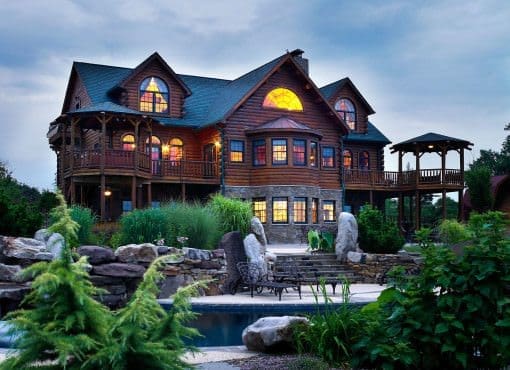Any home buyer wants to be assured that their new property will retain its value, but those considering buying or building a log home usually have specific concerns. Because log homes are unique and their financing requirements may differ from a conventional home, potential builders and buyers may wonder if they’ll be able to secure a loan from a traditional lender, if the value of the log home will hold up over time, and if they’ll be able to resell it in a reasonable amount of time. We can confidently answer YES to all three questions. Log homes of quality construction that are well-maintained and built in desirable areas can be mortgaged by financially stable, traditional lenders, hold up in value, and have a good rate of resale.*
Log Home Lending: A Brief History
The history of lending and appraisals in the log home industry has changed for the better since the 1960s and 70s, when more people began building log homes as a primary residence rather than as a vacation or seasonal home. During that time, appraisers had a difficult time valuing log homes because they weren’t familiar with log home construction, and they often had no comparable listings of similar design and construction.
But in 1992, the Federal National Mortgage Association (Fannie Mae), declared log homes to fall under the “unique” or “custom” home category and declared that their value could be based on three other unique, custom, or rustic homes with comparable sales in the same or a competitive market, as long as the appraiser used sound judgment. Additionally, appraisers have become more familiar with log home construction and their amenities as the log home industry has grown.
The Long-Term Value of Log Homes
The value of log homes not only holds steady, but often increases. In fact, the Log and Timber Homes Council points out that log homes are usually constructed with skill that goes beyond that of conventional carpentry and include upgraded features such as cathedral ceilings, solid wood flooring, energy efficient windows, custom wood cabinetry, and solid wood siding.
Not only that, but log home owners tend to be more involved in the selection and building process of their home than conventional home owners. Studies have shown that log home enthusiasts spend several years gathering large amounts of information on log homes (as opposed to 6-7 months for conventional home buyers) before they make their investment. They seek out general contractors who can provide a turnkey project and want to work closely with them to ensure that their homes are built to their specifications. In other words, they put a great deal of time and effort into their investment and are willing to pay for what they want!
All of this means that most log homes are high in quality and value and are well-cared for, so they generally don’t depreciate and have a good resale value. The Log and Timber Council states that “a study by the National Association of Home Builders (found) no difference in the re-sale value of log homes when compared to other types of housing.”
A Simpler Way of Life
Many Americans are leaving bigger cities to pursue a slower pace of life in smaller towns. The warmth, beauty, and solid construction of a log home represent a simpler way of living, and as a result, the log home industry has enjoyed continued growth for the past decade. We anticipate that this growth will continue for years to come.
Big Twig Log Homes is committed to helping you realize your dream of living in a log home. We proudly represent Katahdin Cedar Log Homes, a leader in the log home industry for nearly 50 years. We provide turnkey construction solutions and excel at walking with you through the entire process of building a log home, from lot assessment to move-in. For more information on the loan process for log homes, click here. To learn more about log home values and resale tips, click here.
*Big Twig Homes does not make any promises or guarantees regarding mortgage qualifications or securement, appraisal values of log homes, or the sale or resale of log homes. The information in this article is based on information provided by the Log and Timber Homes Council, a branch of the National Homebuilders Association. You can read the entire article here.







